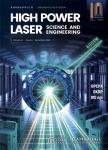Data-driven science and machine learning methods in laser-plasma physics
作者机构:Ludwig-Maximilians-Universität MünchenGarchingGermany Department of PhysicsClarendon LaboratoryUniversity of OxfordOxfordUK School for Mathematics and PhysicsQueen’s University BelfastBelfastUK
出 版 物:《High Power Laser Science and Engineering》 (高功率激光科学与工程(英文版))
年 卷 期:2023年第11卷第5期
页 面:10-50页
核心收录:
学科分类:0808[工学-电气工程] 0809[工学-电子科学与技术(可授工学、理学学位)] 07[理学] 0807[工学-动力工程及工程热物理] 0827[工学-核科学与技术] 0805[工学-材料科学与工程(可授工学、理学学位)] 070204[理学-等离子体物理] 0703[理学-化学] 0702[理学-物理学] 0801[工学-力学(可授工学、理学学位)]
主 题:deep learning laser-plasma interaction machine learning
摘 要:Laser-plasma physics has developed rapidly over the past few decades as lasers have become both more powerful and more widely *** experimental and numerical research in this field was dominated by single-shot experiments with limited parameter ***,recent technological improvements make it possible to gather data for hundreds or thousands of different settings in both experiments and *** has sparked interest in using advanced techniques from mathematics,statistics and computer science to deal with,and benefit from,big *** the same time,sophisticated modeling techniques also provide new ways for researchers to deal effectively with situation where still only sparse data are *** paper aims to present an overview of relevant machine learning methods with focus on applicability to laser-plasma physics and its important sub-fields of laser-plasma acceleration and inertial confinement fusion.



